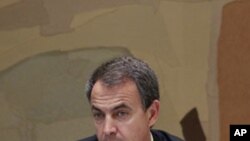In 2004, Spain suffered Europe's worst act of Islamic terrorism when bombs blamed on al-Qaida killed 191 people at a Madrid train station.
In the wake of al-Qaida leader Osama bin Laden's death, Spain is reinforcing security and remembering its dead.
Terror in Madrid, March 11, 2004
After Sept. 11, 2001, the single most deadly al-Qaida-linked attack on the West happened at Madrid's Atocha train station. On March 11, 2004, 191 people died and more than 1,800 were wounded by bombs planted on four commuter trains.
Jesus and Gloria Seron lost a close relative, 37-year-old Federico Sierra Seron. A military officer, he was survived by his wife and three-year-old son.
Jesus Seron says considering what their family has been through, bin Laden's death is the best possible outcome.
But his wife says she's not so sure.
Gloria Seron says bin Laden's death represents neither a success, nor a failure. She says she appreciates that the al-Qaida leader is gone, but shrugs her shoulders when asked if Spain -- and the world -- are safer without him. She quotes an old proverb, saying "he who lives by the sword, dies by the sword."
The 2004 Atocha bombings -- which struck three days before Spain's general election that year -- had a profound affect on Spanish politics. At first, the center-right government blamed the Basque separatist group ETA for the attacks, and is thought to have lost the election because of that mistake. Investigators quickly revealed that Islamic militants inspired by al-Qaida had planted the bombs, in part because of Spain's participation in the Iraq war. Less than two months later, Spain's new Socialist government withdrew troops from Iraq.
More than two dozen suspects of Moroccan, Algerian and Syrian descent were charged in the Atocha bombings. Two are currently serving life sentences.
Future threats
In life, bin Laden inspired terrorists like those who killed 191 people here in Madrid. But Gloria Seron said she fears that in death, bin Laden could still do the same.
Seron says she's worried bin Laden could become a hero for other militants, and that his death could prompt more violence, by people trying to defend his name.
Spain's interior minister, Alfredo Perez Rubalcahba, echoed Gloria's feelings at a news conference in Madrid. He said he's relieved bin Laden is dead, but that it's not time for Spain to lower its guard.
Rubalcaba says without a doubt, bin Laden's death is a blow to al-Qaida. But he says we can't rule out reprisal attacks. And he notes that Spain is well within striking distance of al-Qaida's North African branch, which is being investigated in a recent bombing at a tourist cafe in Morocco.
Spain is currently on terror alert level two, on a four-point scale. Rubalcaba said government ministers are meeting Tuesday to discuss new security measures, but that the terror alert level won't be raised. He wouldn't comment on security specifics.
Security barriers erected in 2004 remain outside Madrid's Atocha train station. On hearing news of bin Laden's death, Gloria and Jesus Seron passed through those barriers and stopped to gaze at a memorial built near the site where their relative and 190 others were killed.
Gloria Seron says nothing can bring her loved one back. She says the only thing that remains is to prevent such attacks from ever happening again.




